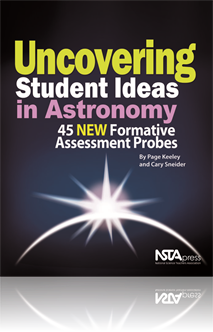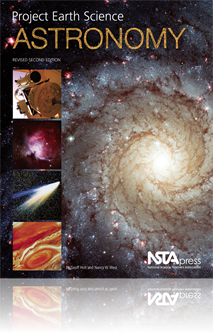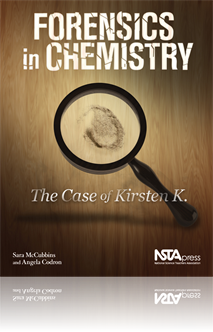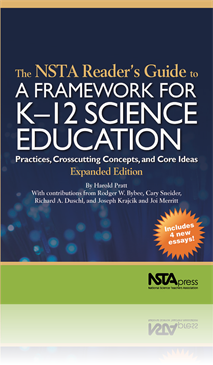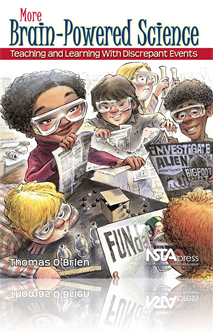All Resources
Book Chapter
The purpose of this assessment probe is to elicit students’ ideas about how much of the spherical Moon is lit by the Sun at any point in time. The probe is designed to reveal whether students recognize that at any point in time the Sun shines on ha...
Book Chapter
Does the Earth Go Through Phases?
The purpose of this assessment probe is to elicit students’ ideas about “Earth phases” and “Earth sets.” The probe is designed to find out if students understand the Earth-Sun-Moon system well enough to imagine how the Earth would appe...
Book Chapter
The purpose of this assessment probe is to elicit students’ ideas about gravity. The probe is designed to determine whether students understand the role of gravity in maintaining the Moon in its orbit....
Book Chapter
What’s Inside Our Solar System?
The purpose of this assessment probe is to elicit students’ ideas about the solar system. The probe is designed to find out if students can distinguish between objects in the solar system and objects outside of the solar system and recognize that t...
Book Chapter
The purpose of this assessment probe is to elicit students’ ideas about representations of the solar system. The probe is designed to reveal students’ ideas about the overall shape of the solar system and the planets within it. ...
Book Chapter
The purpose of this assessment probe is to elicit students’ ideas about space travel. The probe is designed to reveal how far students think humans have traveled in space since the year 2000. The probe also gives a glimpse into students’ understa...
Book Chapter
Gravity in Other Planetary Systems
The purpose of this assessment probe is to elicit students’ ideas about gravity. The probe is designed to find out if students recognize the effect of mass on gravitational attraction, and that neither a planet’s spin nor its distance from t...
Book Chapter
The purpose of this assessment probe is to elicit students’ ideas about objects in the night sky. The probe is designed to uncover students’ understanding of the nature of meteors, comets, and stars. ...
Book Chapter
The purpose of this assessment probe is to elicit students’ understanding of stars in constellations. The probe is designed to find out whether students recognize that stars are distributed in space, that some stars are brighter than others, and th...
Book Chapter
The purpose of this assessment probe is to elicit students’ ideas about the size of objects in the sky. The probe is designed to see if students recognize that the Sun and other stars are much bigger than the Earth, Moon, or any of the planets but ...
Book Chapter
The purpose of this assessment probe is to elicit students’ ideas about how astronomers investigate the composition of stars. The probe is designed to see if students recognize that the colors from the light given off by a star (its spectrum) revea...
Book Chapter
What Happens to Stars When They Die?
The purpose of this assessment probe is to elicit students’ ideas about stars’ life cycle. The probe is designed to reveal what students think occurs at the end of a star’s life. ...
Book Chapter
The purpose of this assessment probe is to elicit students’ ideas about what happens to stars over time. The probe is designed to reveal whether students recognize that occasionally new stars are “born,” change over time, and eventually “di...
Book Chapter
The purpose of this assessment probe is to elicit students’ ideas about stars and the origin of the chemical elements. The probe is designed to reveal their thinking about the role of stars in transforming hydrogen and helium into heavier chemical ...
Book Chapter
The purpose of this assessment probe is to elicit students’ ideas about our home galaxy, the Milky Way. The probe is designed to reveal whether students recognize that our solar system is inside the Milky Way, that on clear moonless nights we can ...
Book Chapter
The purpose of this assessment probe is to elicit students’ ideas about the big bang theory. The probe is designed to reveal the extent of their qualitative understanding of what is expanding according to the theory. ...
Book Chapter
Is the Big Bang “Just a Theory”?
The purpose of this assessment probe is to elicit students’ ideas about the big bang as a theory. The probe is designed to find out if students can distinguish a scientific theory from the use of theory in everyday conversation. ...
Book Chapter
The purpose of this word use probe is to elicit students’ ideas about two commonly confused words in astronomy—rotate and revolve. The probe is designed to find out if students can conceptually distinguish between the two terms and how they use ...
Book Chapter
The purpose of this assessment probe is to elicit students’ ideas about the position of the Sun in relation to the Earth. The probe is designed to find out how students envision the Earth as a sphere in space and its relationship to the Sun by aski...
Book Chapter
The purpose of this assessment probe is to elicit students’ ideas about the apparent movement of the Sun. The probe is designed to reveal where students think the Sun rises and sets, and how it moves during the day. ...
Book Chapter
The purpose of this assessment probe is to elicit students’ ideas about the Sun’s motion during the day. The probe is designed to reveal whether students know that the Sun is never directly overhead as viewed from the continental United States. ...
Book Chapter
The purpose of this assessment probe is to elicit students’ ideas about relative distance. The probe is designed to find out if students can apply the same scale used to represent the difference in sizes between the Earth and Sun to also repre...
Book Chapter
The purpose of this assessment probe is to elicit students’ ideas about eclipse phenomena. The probe is designed to determine if students have a mental model of the Earth-Sun-Moon system that allows them to figure out why we see more eclipses of th...
Book Chapter
How Long Is a Day on the Moon?
The purpose of this assessment probe is to elicit students’ ideas about the day-night cycle on the Moon. The probe is designed to find out if students can coordinate two concepts: the Moon turns once on its axis each month, and half of the Moon ...
Book Chapter
The purpose of this assessment probe is to elicit students’ ideas about Earth’s gravity. The probe is designed to find out how students think gravity acts inside the Earth. ...
NSTA Press Book
Uncovering Student Ideas in Astronomy: 45 New Formative Assessment Probes
What do your students know—or think they know—about what causes night and day, why days are shorter in winter, and how to tell a planet from a star? Find out with this book on astronomy, the latest in NSTA’s popular Uncovering Student Ideas in ...
By Page Keeley, Cary Sneider
Book Chapter
It is difficult to measure objects in the solar system because it is so massive. In this activity, students use a cross-staff to measure the angular diameter of a paper plate 4 m away. From this, they learn to measure the actual or true diameter of d...
Book Chapter
Understanding the causes of Earth’s seasons is quite challenging and is often misunderstood. Earth’s seasons are caused by the combination of its orbit around the Sun and the tilt of Earth’s axis in relation to that orbit. These factors cause t...
Book Chapter
Introduction to the Curriculum
In this chapter, the development behind this book is discussed. As well as the importance of performance-based assessment and preparing your students for inquiry labs. This chapters gives you an overview of what you will find in the book The Case o...
Book Chapter
Before delving into each individual activity presented in the book, The Case of Kirsten K. , it is important to understand an overall picture of the forensics case itself and what is expected of the students. This chapter will also explain how infor...
Book Chapter
The Cooler and Delivery Truck Evidence
Based on your students’ knowledge of chemistry, local police have asked for their help in solving a local missing-persons case. The victim in this case is Kirsten K. Your students will try to determine which of the suspects is most likely responsib...
Book Chapter
In this chapter, the police are asking your students to analyze new evidence to determine the type of chemical substances present and possibly match the substances at the crime scene to the suspects involved in the case. This performance assessment c...
Book Chapter
The Nuclear Radiation Evidence
The performance assessment, in this chapter, consists of four parts. In the first part, your students will analyze the soil samples collected at the crime scene and compare them to soil samples from each of the suspects’ shoes. In the second part, ...
Book Chapter
A second victim has been found! In this chapter, four performance assessments are presented. In part I of the assessment students will need to analyze fingerprints. Secondly, students will try to match the two types of guns with the aluminum and copp...
Book Chapter
Police have learned some additional information about the suspects involved in this case, and their relationship to the victim. In Part I of the performance assessment, Police have mixed up the infared spectroscopy (IR Spectra) for each of the chemic...
Book Chapter
As with all large projects, there are often many ways to approach the final assessment. Since the inception of this project, the authors have tried numerous methods to evaluate this yearlong performance assessment—some that worked, and some that di...
Book Chapter
Dimension 3: Disciplinary Core Ideas: Physical Sciences
This chapter reviews how the physical science section has been organized under the following four core ideas and 13 component ideas. This sample chapter also includes the Table of Contents and Index. ...
Book Chapter
Archimedes, the Syracuse (Sicily) Scientist: Science Rules Balance and Bathtub Basics
Learners, in this activity, are guided to discover simple, quantitative relationships that support their qualitative observations of playing on seesaws (with different-size children) and taking baths....



